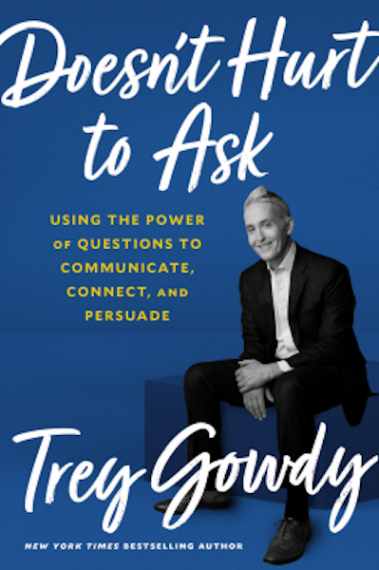Trey Gowdy shares in in his book, Doesn’t Hurt to Ask, the effective and powerful communication success strategies he’s honed as a seasoned prosecuting attorney and congressman. Stressing the virtue and power of thought-provoking questions, Gowdy outlines how crafting and delivering the right query, and following it up with deep listening, is the key to getting results for ourselves and those we want to help.
But this isn’t as easy as we think.
Rather, the intricate process of questioning is an art that when sharpened, provides innumerable benefits to both parties while achieving powerful results.
He also reminds that we all want to be effectively advocated for as well as being effective advocates for others. This requires three things: demonstrating effective communication skills including listening, asking the right questions and learning how to persuade others. Keep in mind, persuasion is not about forcing results but rather understanding what people believe in and why they believe it and building arguments that subtly persuade others in a way that may have life-changing potential. And great persuaders know that listening is just as important as asking because in asking you are developing an understanding of where the other person is coming from, their motivations and needs. This knowledge places you in a powerful position to help all parties involved.
I took away from Gowdy’s book a plethora of notes revolving around these themes: The art of persuasion, deep listening, effective advocacy and crafting thoughtful questions.
I could also tell that he is driven to help others who may not be in a position to help themselves and is challenging the reader to use the communication tools at their disposal to do the same. This, in theory, should make it easy because we can all ask, listen and persuade. The problem lies in the fact that we don’t always do so effectively. That’s why this book will be a useful tool for success-minded readers. Gowdy outlines the key communication strategies that should be conditioned and rehearsed so that you can use these powerful tools more thoughtfully and effectively to achieve big results.
You can easily see the breadth of applications from parenting to leading a company or changing organizational policy to procuring resources for those in need. And truth be told, we can all use some polishing up of our communication skills. What I also enjoyed was his telling of examples of how these powerful communication tools were effectively applied both in the courtroom and in real life. These examples provided inspiration for the reader to understand how to gain similar results.
But let’s not gloss over a powerful message in this book—skill can only take you so far.
Authenticity and likeability are key. You cannot be an effective advocate for others (or for yourself) if you don’t first establish trust. You also need to be willing to take advantage of opportunities that present themselves for advocacy. While success is always the driving factor in this list of reads, remember, it has many interpretations. Gowdy (and I) challenge you to think how sharpening these skills can be successfully wielded toward the greater good.
Image courtesy of Crown Publishing


No comments yet.